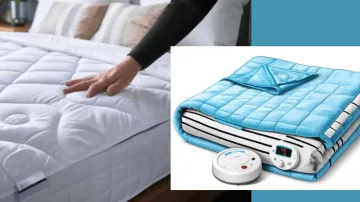Electric blankets vs heated mattress pads: Pros, cons and safety tips
Electric blankets and heated mattress pads are two popular heating solutions for people living in colder regions. These devices promise a cosy and comfortable night's sleep, but you may be wondering which one is better and safer for you. Which one is safer for you?

Winter nights could be unbearable if you are someone who is living in the northern parts of India, (around UP, Bihar, Punjab, Haryana, Uttrakhand, Himachal Pradesh and more surrounding regions where the winters are at their peak in December). And everyone is looking for one or the other way to keep up with the weather- by piling extra layers of clothes when stepping out of the house, layering blankets, and socks. But you do not have to pile yourself up when it is winter, rather, you could use one thin blanket which could be a great help to you.
Have you heard about electric blankets or heated mattress pads? Well, if not, then let me tell you that they are the two most popular options which are being considered by the people who are residing in the cold areas. Both these electrical heating instruments are unique, but which one is better and safer for you? Let us tell you this in detail.
Electric Blankets: Pros, cons and safety tips
Electric blankets have gained popularity over the period of time, and they come with embedded heating elements to generate warmth. These elements are controlled by a temperature regulator, that enables the user to adjust the heat as per your liking.
Pros
- Quick heating within minutes.
- Dual controls for shared beds.
- Can be used to preheat or maintain warmth overnight.
Cons
While electric blankets offer convenience and warmth, they come with certain drawbacks that require caution:
- Safety concerns: Electric blankets have been associated with incidents of overheating, electric shocks, and even fire hazards, particularly if the wiring is damaged or the blanket is improperly used.
- Not suitable for everyone: Individuals with certain medical conditions, such as diabetes, or circulation problems, or those who are pregnant, are often advised to avoid electric blankets due to potential health risks.
- Restricted use for children: Electric blankets are not recommended for unsupervised use by children, as they may not be able to regulate the settings safely.
- Maintenance and wear: Over time, the internal wiring can become worn or damaged, increasing the risk of malfunctions. Proper storage and handling are essential to prolong the blanket's lifespan and ensure safety.
Safety tips for using electric blankets
- Inspect for damaged blanket for visible wear, tears, or damaged wiring before use. Avoid using it if any damage is detected.
- Always adhere to the guidelines provided by the manufacturer, including proper usage and maintenance.
- Avoid overnight use: Use the blanket to preheat your bed, then turn it off before sleeping.
- Keep away from liquids- near water or in damp conditions to avoid electrical hazards.
- Avoid folding or creasing as it could damage the heating elements. Store it in flat or rolled when not in use.
- Use compatible bedding to avoid placing heavy bedding or quilts on top of the electric blanket, as it may cause overheating.
- Unplug when not in use
- Children, elderly individuals, or people with medical conditions should use electric blankets under supervision.
- Keep pets away as they may chew on the wires or scratch the blanket, which may increase the risk of damage or injury.
- Replace older models: Modern electric blankets come with safety features like auto shut-off. Consider upgrading if yours is an older model.
Heated mattress pads
Heated mattress pads are another trending product which has gained popularity, and can keep your bed warm during winter. This pad fits directly over your mattress and provides warmth from underneath.
How they work:
- Water is heated and circulated through the pad.
- Ensures consistent, even warmth all night.
- Setup involves filling the control unit and selecting the temperature.
- Modern mattress pads come with auto shut-off features, ensuring safety throughout the night.
Here are a few pros, cons, and safety tips:
Pros:
- Heated mattress pads provide consistent, even warmth throughout the night, making them ideal for long-term use- claims some brands.
- It is typically thicker and wire-free, offering a more plush, seamless warmth.
- Although they consume slightly more energy (60-90 watts), they are efficient at maintaining heat overnight, reducing energy usage over time.
Cons:
- Slower to Warm Up
- Less portable as they are designed for use on the bed, making them stationary.
- Higher initial cost
Safety Tips
- Regularly inspect the blanket for any frayed wires, rips, or damage. Replace it if any issues are found.
- Follow instructions: Always read and follow the manufacturer’s guidelines for proper use and maintenance.
- Avoid using overnight to prevent overheating and potential safety hazards
- Store properly and keep your blanket flat or rolled up
- By understanding the pros, cons, and safety precautions of both options, you can make an informed choice about the best heating solution for your winter nights.
Price and value: Which is economical?
- Electric Blankets: Affordable, making them a great budget-friendly option.
- Heated Mattress Pads: Higher initial cost but offer better long-term value for regular use in colder climates.
Which one should you choose?
- Go for electric blankets if you need quick, portable warmth at an affordable price.
- Opt for heated mattress pads if you prefer consistent all-night warmth and added comfort.
ALSO READ: Free Aadhaar card update deadline extends until June 14, 2025
ALSO READ: Never lose a YouTube video again: Save it to ‘Watch Later’